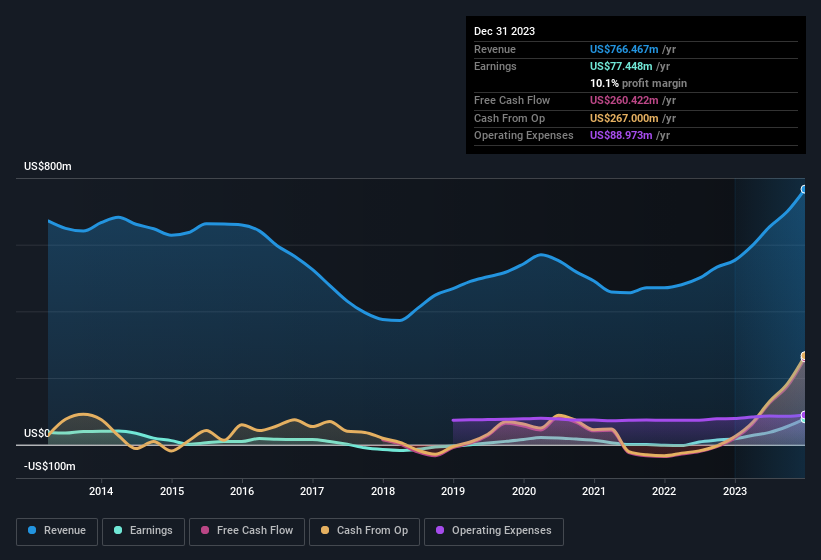- United States
- /
- Electrical
- /
- NasdaqGS:POWL
The Strong Earnings Posted By Powell Industries (NASDAQ:POWL) Are A Good Indication Of The Strength Of The Business

When companies post strong earnings, the stock generally performs well, just like Powell Industries, Inc.'s (NASDAQ:POWL) stock has recently. We did some digging and found some further encouraging factors that investors will like.
See our latest analysis for Powell Industries

Zooming In On Powell Industries' Earnings
As finance nerds would already know, the accrual ratio from cashflow is a key measure for assessing how well a company's free cash flow (FCF) matches its profit. In plain english, this ratio subtracts FCF from net profit, and divides that number by the company's average operating assets over that period. The ratio shows us how much a company's profit exceeds its FCF.
Therefore, it's actually considered a good thing when a company has a negative accrual ratio, but a bad thing if its accrual ratio is positive. That is not intended to imply we should worry about a positive accrual ratio, but it's worth noting where the accrual ratio is rather high. To quote a 2014 paper by Lewellen and Resutek, "firms with higher accruals tend to be less profitable in the future".
Powell Industries has an accrual ratio of -1.84 for the year to December 2023. Therefore, its statutory earnings were very significantly less than its free cashflow. In fact, it had free cash flow of US$260m in the last year, which was a lot more than its statutory profit of US$77.4m. Powell Industries shareholders are no doubt pleased that free cash flow improved over the last twelve months.
That might leave you wondering what analysts are forecasting in terms of future profitability. Luckily, you can click here to see an interactive graph depicting future profitability, based on their estimates.
Our Take On Powell Industries' Profit Performance
As we discussed above, Powell Industries' accrual ratio indicates strong conversion of profit to free cash flow, which is a positive for the company. Based on this observation, we consider it possible that Powell Industries' statutory profit actually understates its earnings potential! Furthermore, it has done a great job growing EPS over the last year. Of course, we've only just scratched the surface when it comes to analysing its earnings; one could also consider margins, forecast growth, and return on investment, among other factors. With this in mind, we wouldn't consider investing in a stock unless we had a thorough understanding of the risks. While conducting our analysis, we found that Powell Industries has 2 warning signs and it would be unwise to ignore these.
Today we've zoomed in on a single data point to better understand the nature of Powell Industries' profit. But there is always more to discover if you are capable of focussing your mind on minutiae. For example, many people consider a high return on equity as an indication of favorable business economics, while others like to 'follow the money' and search out stocks that insiders are buying. While it might take a little research on your behalf, you may find this free collection of companies boasting high return on equity, or this list of stocks that insiders are buying to be useful.
New: Manage All Your Stock Portfolios in One Place
We've created the ultimate portfolio companion for stock investors, and it's free.
• Connect an unlimited number of Portfolios and see your total in one currency
• Be alerted to new Warning Signs or Risks via email or mobile
• Track the Fair Value of your stocks
Have feedback on this article? Concerned about the content? Get in touch with us directly. Alternatively, email editorial-team (at) simplywallst.com.
This article by Simply Wall St is general in nature. We provide commentary based on historical data and analyst forecasts only using an unbiased methodology and our articles are not intended to be financial advice. It does not constitute a recommendation to buy or sell any stock, and does not take account of your objectives, or your financial situation. We aim to bring you long-term focused analysis driven by fundamental data. Note that our analysis may not factor in the latest price-sensitive company announcements or qualitative material. Simply Wall St has no position in any stocks mentioned.
About NasdaqGS:POWL
Powell Industries
Designs, develops, manufactures, sells, and services custom-engineered equipment and systems.
Flawless balance sheet with solid track record.
Similar Companies
Market Insights
Community Narratives



